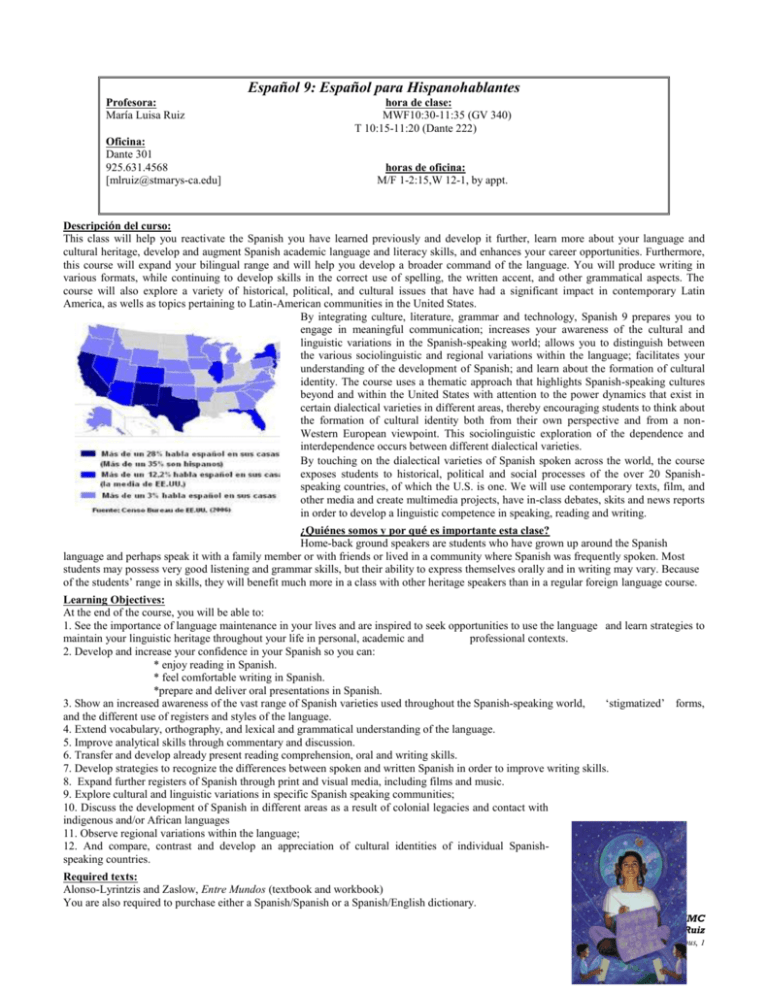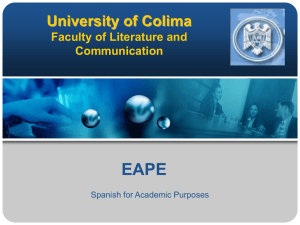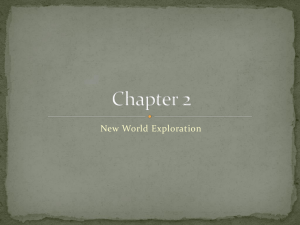Syllabus
advertisement

Español 9: Español para Hispanohablantes Profesora: María Luisa Ruiz Oficina: Dante 301 925.631.4568 [mlruiz@stmarys-ca.edu] hora de clase: MWF10:30-11:35 (GV 340) T 10:15-11:20 (Dante 222) horas de oficina: M/F 1-2:15,W 12-1, by appt. Descripción del curso: This class will help you reactivate the Spanish you have learned previously and develop it further, learn more about your language and cultural heritage, develop and augment Spanish academic language and literacy skills, and enhances your career opportunities. Furthermore, this course will expand your bilingual range and will help you develop a broader command of the language. You will produce writing in various formats, while continuing to develop skills in the correct use of spelling, the written accent, and other grammatical aspects. The course will also explore a variety of historical, political, and cultural issues that have had a significant impact in contemporary Latin America, as wells as topics pertaining to Latin-American communities in the United States. By integrating culture, literature, grammar and technology, Spanish 9 prepares you to engage in meaningful communication; increases your awareness of the cultural and linguistic variations in the Spanish-speaking world; allows you to distinguish between the various sociolinguistic and regional variations within the language; facilitates your understanding of the development of Spanish; and learn about the formation of cultural identity. The course uses a thematic approach that highlights Spanish-speaking cultures beyond and within the United States with attention to the power dynamics that exist in certain dialectical varieties in different areas, thereby encouraging students to think about the formation of cultural identity both from their own perspective and from a nonWestern European viewpoint. This sociolinguistic exploration of the dependence and interdependence occurs between different dialectical varieties. By touching on the dialectical varieties of Spanish spoken across the world, the course exposes students to historical, political and social processes of the over 20 Spanishspeaking countries, of which the U.S. is one. We will use contemporary texts, film, and other media and create multimedia projects, have in-class debates, skits and news reports in order to develop a linguistic competence in speaking, reading and writing. ¿Quiénes somos y por qué es importante esta clase? Home-back ground speakers are students who have grown up around the Spanish language and perhaps speak it with a family member or with friends or lived in a community where Spanish was frequently spoken. Most students may possess very good listening and grammar skills, but their ability to express themselves orally and in writing may vary. Because of the students’ range in skills, they will benefit much more in a class with other heritage speakers than in a regular foreign language course. Learning Objectives: At the end of the course, you will be able to: 1. See the importance of language maintenance in your lives and are inspired to seek opportunities to use the language and learn strategies to maintain your linguistic heritage throughout your life in personal, academic and professional contexts. 2. Develop and increase your confidence in your Spanish so you can: * enjoy reading in Spanish. * feel comfortable writing in Spanish. *prepare and deliver oral presentations in Spanish. 3. Show an increased awareness of the vast range of Spanish varieties used throughout the Spanish-speaking world, ‘stigmatized’ forms, and the different use of registers and styles of the language. 4. Extend vocabulary, orthography, and lexical and grammatical understanding of the language. 5. Improve analytical skills through commentary and discussion. 6. Transfer and develop already present reading comprehension, oral and writing skills. 7. Develop strategies to recognize the differences between spoken and written Spanish in order to improve writing skills. 8. Expand further registers of Spanish through print and visual media, including films and music. 9. Explore cultural and linguistic variations in specific Spanish speaking communities; 10. Discuss the development of Spanish in different areas as a result of colonial legacies and contact with indigenous and/or African languages 11. Observe regional variations within the language; 12. And compare, contrast and develop an appreciation of cultural identities of individual Spanishspeaking countries. Required texts: Alonso-Lyrintzis and Zaslow, Entre Mundos (textbook and workbook) You are also required to purchase either a Spanish/Spanish or a Spanish/English dictionary. Fall 2013, SMC Profa Ruiz Syllabus, 1 Readings and other relevant material will be handed out throughout the semester. Some of the additional reading materials (listed as ‘handout’ on the calendar) are available on reserve at the library under the course number and on the class Moodle site. I strongly urge you to familiarize yourself with Moodle as we will be using it, in addition to other online resources, throughout the semester. Your course grade will be based on the following: Participation/Attendance/Daily assignments/quizzes: Daily Homework/Journals Midterm exam: Presentations: Essays (#1 and #2): Final projects essay/group project: 12% 12% 12.5% 14.5% 23% 25% Evaluación: Participation/class attendance (12%): Class participation, whether by attending class or collaborating during an in-class discussion, is an integral part to both your own linguistic development and that of your classmates. Part of the learning process for you individually and the class as a whole is regularly being in an environment in which you can actively speak, read and write in Spanish. Therefore, it is important that you attend class on time and come prepared to participate as fully as possible. See section on “Classroom rules” for further information. The various exercises we will complete in class are primarily designed to offer you a way to gauge your progress in specific areas. These assignments are intended as practice and to reinforce the various aspects of Spanish that we discuss in class, such as spelling and accents. These assignments then, are important in that I will use these to assess your individual progress and will help me plan the pace and presentation of the various linguistic aspects that will be covered in class. Daily Homework/Journals: 12%: You are expected to keep a journal/notebook in which you will be expected to keep daily notes, writing tasks, creative activities and selfreflections. Additionally, you are to dedicate a section of your notebook to ‘palabras bonitas’ that you stumble across in the readings and see if you can use them in your own writings. For example, you may want to write a micropoem a short short story, a letter to a family member, or any creative interpretation of 3-4 of the words/phrases you liked. You may also be asked to do journal writing in class and every few weeks or so, we will share some of the micropoems, short short stories and other ‘palabras bonitas’ with each other. Additionally, I ask that, as part of your ‘homework’, you make note of in your journal (every week or so) times that you have used your Spanish outside of the classroom: did you talk to a family member at a quinceañera? Did you listen to (and sing along with) Selena or other music in Spanish? Do you watch shows/events, go to a concert, poetry readings, watch a movie that was in Spanish? Do you participate in volunteer opportunities/in work situations where you use your Spanish? Did you dream in Spanish? Did you have a conversation in which you spoke both Spanish and English or in which you spoke completely in Spanish? In addition to jotting down those moments where you engage with Spanish outside of the classroom, I’d like for you to reflect on your experiences with the language/situation. For example, how comfortable were you speaking/listening to the language? Did you hear any words/information that piqued your interest? A note on the weekly reading from “Entre Mundos”: I encourage (and expect!) you to engage actively with the readings (even those that you find puzzling or difficult): underline key words, phrases, and/or ideas; write notes to yourself in the margins; come up with a one or two sentence summary of the reading as soon as you are done with it; ask questions of the to yourself as you read. If you don’t want to write in the book itself, I suggest you have a section of your class notebook dedicated to your thoughts on the reading **Organize your notebook as you wish; I prefer ones that are divided into 2-3 sections, that way you have a specific place for your vocabulary, daily writing assignments, reading group tasks, etc. Presentations: (2%) The first presentation will be from 2 to 3 minutes in which you present yourself to the class. I will be evaluating you on organization, clarity, engagement with material and class, and how well you use the time allotted. You are to: -Choose a song that is important to you or bring in an object that represents you/an important event in your life (i.e. if you play an instrument, bring it in and play a small piece -Tell us who you are (where you are from, your name, etc. -Tell us something important/significant about you (i.e. you play a sport, play an instrument, etc.) -Tell us the significance of the song/item/skill to you and why you chose it. -If you bring in a song, you MUST bring the song lyrics with you to class so that we can follow along as we hear it. Midterm presentation: (12.5%) will be from seven to ten minutes and is an informative presentation. I will be evaluating you on organization, clarity, engagement with material and class, and how well you use the time allotted. The presentation topics are the following. These topics are designed to highlight the dependence and interdependence of how language is transformed by forces of globalization. 1. Dialectical varieties of Spanish -Choose a dialectical variety of Spanish (i.e. Cuban Spanish, Coastal Colombian Spanish) -Investigate the history of Spanish in that region (i.e. who brought it over? Which dialect carried more prestige than others? Did it mix with any indigenous languages?) -Find out any unique characteristics about that dialect (i.e. do they use vos? What are some common vocabulary words that speakers use? -Interview or find a section of a movie, a song, or any other media in which that dialect is spoken and present it to class and how globalization has influenced and/or changed them? 2. Language Attitudes: who speaks the ‘best’ Spanish? -Why do some people not like certain accents in Spanish? -What misconceptions are there about certain dialectal varieties (i.e. is it vocabulary differences or accent?) -Interview and record at least 2 Spanish Speakers about what they think about different dialects. -Interview and record a native English Speaker about what they think about Spanish Speakers and the different accents in Spanish. Fall 2013, SMC Profa Ruiz Syllabus 2 3. ¿Spanglish:A new dialect of Spanish? -What is Spanglish?, What are the reasons why this phenomenon exists? -What do Spanish speakers think about Spanglish and the people who speak it? -What are some examples of so-called “Spanglish”? -Interview and record Spanish speakers about what they think of Spanglish. -Find a section of a movie, a song, any other media, or examples from friends in which they use Spanglish. Midterm exam (12%): The purpose of the midterm exam is to assess your progress up to that point in the class. The topics on the exams then, will only cover the information discussed up to that point. Essays (23%): You will be asked to complete a series of essays during the course of the semester, each having a different focus and in which you will practice writing and developing your use of different types of written Spanish. For each of them, you will have the opportunity to work with your classmates by commenting actively on their work. We will then practice editing the essays for specific characteristics that will be covered in class, such as accents and spelling. I’ll also comment on the form and content of the essays. Once this process is complete, you will then have the opportunity to revise and edit your essays. Further information on the essays will be discussed in class. The grade breakdown for the essays is as follows: essay #1:10%, essay #2:15% (essay #2 is linked to your midterm presentation), essay #3: 15% (essay #3 is linked to your final project) Essay #1(narrative/creative essay) [2-3 pages in length]: The poems and stories you have read are loosely autobiographical while others are clearly fictional. However, they all share creativity in expression and humor in some cases, nostalgia in others. In your first essay, you are to write a short story in which you try to creatively express a fictionalized memory or a clearly made up story. Use the stories and poems you have read thus far as inspiration. Choose a creative title for your story. You may choose to write a poem in addition to your short story. You will be graded for both content and organization. Your grade will be based on your creativity, the plot, the characters, etc. in addition to the writing (i.e. spelling, accents) aspects that we have studies up to that point. Essay #2 (informational essay) [3-4 pages in length]: Use the topic you are researching for your presentation for your informational essay. In your informational essay, choose a topic, pose a question, and research information about that topic (you may use research from your presentation to write this essay). I expect you to consult at least TWO sources in Spanish. In this essay, the purpose is to PRESENT information about a topic that the class and you don’t know much about. You can use the articles that I have provided for you throughout the semester in addition to the audio selections. You will be graded for both content and organization. Essay #3 [4-5 pages in length]: This essay is a short research paper that is linked to the group project we will work on during the semester. For this essay, you must conduct research (2 sources in Spanish), present the information and then use that information as the basis for your presentation. You will be graded for both content and organization. Note: All essays are to be turned in on the specified due date. No late papers will be accepted. They are to be typed, double spaced, Times New Roman 12pt. font, one inch margins and should follow standard MLA format. No late, or hand-written papers will be accepted. A paper is considered late if you come late to class the day it is due and points will be deducted from both the paper grade and your participation grade. Please, no emailed papers. Final Project (individual/group): (25%): Your final project will consist of an individual essay (see above)(12.5%), a group script and a group project (12.5%) that will be a television show researched, scripted, and presented by the class. This will count towards your final exam grade. We will complete a series of activities during the semester to prepare you for this project. Similar to the midterm, this project is designed to highlight the dependence and interdependence of how language is transformed by forces of globalization. The television show is a collaborative project in which the entire class participates. We will divide the program into various segments (different groups). The class will be expected to choose a topic, or series of related topics and create a cohesive project around that theme. I suggest you use the topics you’ve researched already and create segments like: 1. A historical overview of the development of Spanish in specific Spanish speaking communities. 2. A mock (or real?) interview with a local artist, singer, or performer from specific Spanish speaking communities. 3. Reviews of current albums, songs, performances, art show, a film by a member of specific Spanish speaking communities. 4. Interviews with members of the local community about their attitudes towards other Spanish speaking communities, 5. A short debate/segment on a controversial topic. Each group is responsible for coordinating their particular segment (narrowing it down), conducting all the background research, bringing the necessary visuals (i.e. additional footage of the murals, a sample of a film or song) and any other relevant materials needed for their particular segment. Each group must turn in a script for their segment. You will not get full credit for your segment if you don’t turn in a script in essay format. At least 3-4 minutes of your presentation must be filmed, using the medium of your choice (e.g. Imovie); we will watch the presentations as a class. Your group will be graded on the research, the script, the creativity with which you present your segment and how polished your segment is. I expect you to practice your segment in preparation for the recording. Classroom Rules: 1. In order to try to insure that all class participants experience a stress-free and non-distracting learning environment, the following are put forth and your cooperation solicited: 2. Please bring your books and notebook to class and make sure you complete the assignments before class! 3. Please be on time and don’t leave early. If you arrive late be sure to just take your seat quietly so as not to disrupt the lecture or other ongoing activity. If you must leave early for whatever reason, be aware that it will count as a tardy. You are allowed 3 absences Fall 2013, SMC Profa Ruiz Syllabus 3 4. 5. 6. 7. 8. 9. during the semester. After 3 missed classes, your participation grade will go down 1/2 of a letter grade. Tardies/leaving early also affect your overall grade—3 tardies equal 1 absence. You are responsible for any planned class activity such as a test or quiz even if you were absent from an earlier class in which it was announced. Additionally, you are responsible for all the assignments on the syllabus even if I did not mention them during class. Make sure to check the class Moodle site regularly and make friends with your classmates so that you can find out what you missed if you were absent. It is totally inappropriate to work on other reading or writing activities at length during class. Leave the updating of your appointment book, the studying for some other class, and the reading of material related to another course to your own time out of class. Active cell phones or other electronic devices are not welcome in the classroom. If you regularly carry one of these devices during the day, make sure you shut it off before coming in class. No prolonged bathroom breaks (particularly if instead of using the restroom, you answer the phone or send text messages—trust me, I’ll know). Please allow at least 24 hours for a response to an email. I do have drop in office hours, but if you need to discuss a paper, or another lengthy topic, please inform me set up a specific meeting time. Please do not give me, or send me via email, a draft of a paper or a response paper the day before it is due and expect me to read it. If you want feedback on a paper, please give me the paper at least a week in advance before our office hour visit. Also, chocolate, coffee and other snacks are welcome during individual meetings Administrative Policies: I would like to reiterate that this is a rigorous and intellectually challenging course and I expect full participation for each of you so that we can reach the objectives of the course successfully. If you feel at any point that you are having trouble keeping up with the course, please see me. Plagiarism and other forms of intellectual dishonesty will NOT be tolerated. In this course, we will adhere to the code of conduct as detailed in the honor code found in the student handbook. Please, let’s just avoid any unnecessary grief; things like this make me grouchy. No incompletes will be given, except in extreme cases. No extensions on assignments will be given except in extreme situations. If, at any point during the semester, you are struggling and are concerned about your performance in the class, see me before it becomes a serious problem. We can find solutions together. Academic Advising & Achievement and TASC are committed to providing undergraduates with the guidance necessary to fully realize their potential. Their programs and services support you in planning your studies and reaching your educational, career and life goals. TASC offers a variety of support services and programs that assists students who are experiencing academic difficulties and/or are placed on probation. Student Disability Services extends reasonable and appropriate accommodations that take into account the context of the course and its essential elements for individuals with qualifying disabilities. Students with disabilities are encouraged to contact the Student Disability Services Office at (925) 631-4358 to set up a confidential appointment to discuss accommodation guidelines and available services. Additional information regarding the services available may be found at the following address on the Saint Mary’s website: http://www.stmarys-ca.edu/sds Fall 2013, SMC Profa Ruiz Syllabus 4







